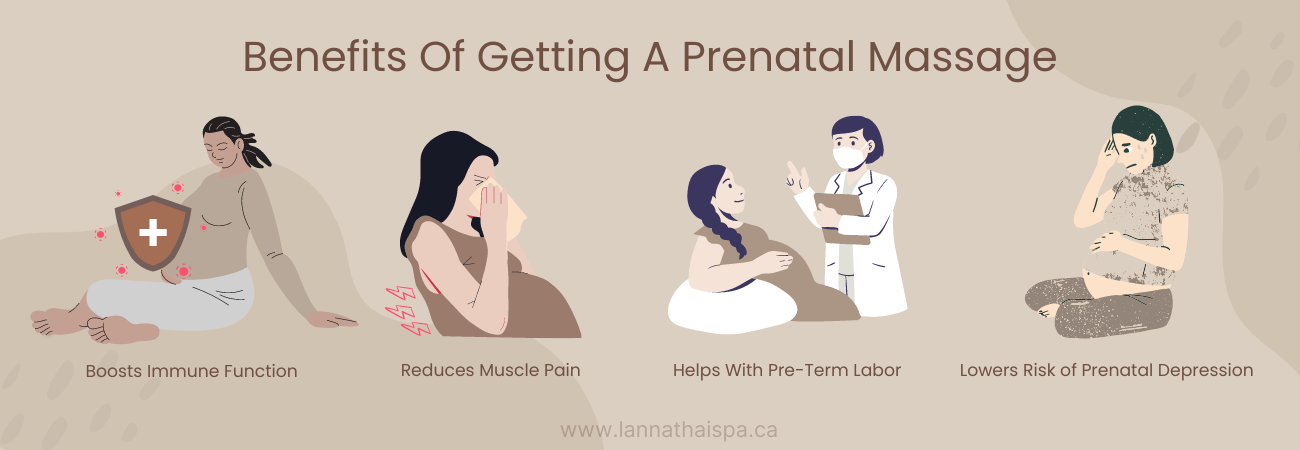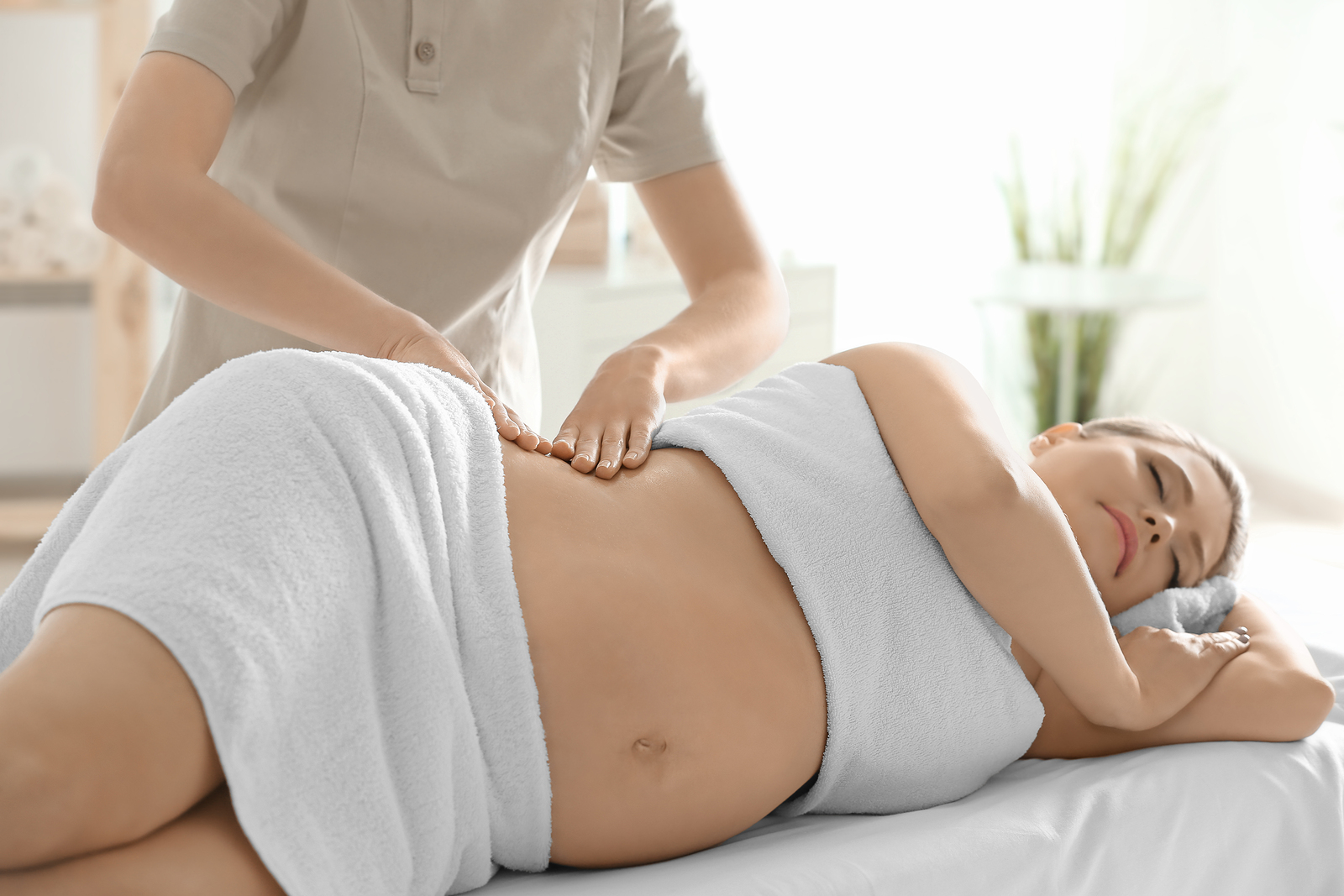Photo Credits to bendtotalbodychiropractic.com
It’s understandable that you want to get a massage while pregnant. We all know how taxing pregnancy can be on a woman, both physically and mentally. You’re always tired and sore, you can’t have a proper night’s sleep, a you’re anxious about everything. But the question is, are you allowed to get a massage during pregnancy?
In this article, let’s talk all about getting a massage while pregnant, the possible benefits moms-to-be can get from it, and some helpful tips for going through a prenatal massage. Let’s get started!
Can You Get A Massage While Pregnant?
The simple answer to this question is yes, pregnant women can get a massage. In fact, a prenatal massage is considered a type of integrative therapy medicine. Glow Birth & Body founder and licensed massage therapist Sara Lyon says “The massage can be transformative, releasing long-held tension with the right pressure and positioning. It takes into account the anatomical and endocrine changes impacting the pregnant body. Prenatal hormones like oxytocin and relaxin are optimal for deep relaxation and tissue healing. It’s an opportunity to take advantage of those hormones and elevate the massage experience.”
During a prenatal massage, trained professionals target areas that typically tighten or store tension during pregnancy, then apply pressure to different parts of the body to stimulate the skin, muscles, ligaments, and tendons. These professionals are careful and they will prioritize the safety of the mother and baby.
When Is The Best Time To Get A Massage While Pregnant?
The answer to this question varies from person to person. However, medical professionals and midwives generally don’t recommend their with-child patients to get a massage during their first trimester of pregnancy because the first 12 weeks is when the risk of miscarriage is highest, according to the American Pregnancy Association (APA).
While no strong research supports the correlation between a first-trimester prenatal massage and miscarriage, your OB-GYN may advise you to wait until you’re at least 24 weeks before getting the service. It’s best to reach out to your doctor or midwife for advice tailored to your specific situation.
However, it’s best for pregnant women who are at risk for gestational diabetes, preeclampsia, or preterm labor to avoid getting a massage at any point in their pregnancy.
Benefits Of Getting A Prenatal Massage
Every pregnant woman deserves to get pampered with a relaxing massage to ease tightness, release tension, and alleviate discomfort. Surprisingly, it’s more than just a pampering experience – it offers plenty of pregnancy benefits that would make a pregnant woman’s journey easier.

Boosts Immune Function
A healthy immune system is important for all, more so if you’re growing a child inside your tummy. Physiologically, a massage helps the body flush out toxins through the lymphatic system and improve circulation throughout the body, which is beneficial to pregnant women.
Reduces Muscle Pain
The body of pregnant women goes through significant changes which can cause a lot of discomfort. As the body experiences increased weight, the parts that are most impacted include the lower back, hips, neck, shoulders, and feet. A prenatal massage can target these areas, easing muscle pain and tension.
Helps With Pre-Term Labor
A pregnancy massage may also help with preterm labor. Pregnant women have a high risk of depression, which is linked to preterm labor and low birth weight for the baby. They also experience elevated levels of the stress hormone cortisol, which also causes pregnancy issues. A prenatal massage can help bring these biochemical changes into balance, maintaining a healthy pregnancy and reducing the risk of preterm labor.
Lowers Risk of Prenatal Depression
Pregnant women go through a rollercoaster of emotions, that’s why anxiety and depression are common during pregnancy. The touch and moderate pressure from a prenatal massage alone activates certain nerve receptors, including the vagus nerve, that help calm the mind. Director of University of Miami School of Medicine’s Touch Research Institute Dr. Tiffany M. Field says “The increase in vagal activity slows down the nervous system; reduces stress hormones like cortisol; increases the love hormone, oxytocin and increases serotonin, the body’s natural antidepressant and anti-pain neurotransmitter.”
Safety Tips For Getting A Massage During Pregnancy
A massage during pregnancy isn’t all that different from a regular massage, but it’s still best to observe some safety precautions if you’re getting one while expecting. Follow these quick safety tips below:
- Speak with Your OB-GYN: Before scheduling a prenatal massage, it’s best to consult with your doctor first. If you’re experiencing pregnancy issues (bleeding, pre-eclampsia, preterm labor, etc.), skip the massage but if you’re unsure, seek the advice of a medical professional.
- Assume a Safe Position: You should be lying on your side or sitting upright or in a semi-reclining position during your massage, as opposed to lying on your back or stomach. Not only is it the most comfortable, but lying on your back for some time during your second trimester can also be unsafe, as it can compress some important blood vessels which can decrease blood flow to your baby.
- Be Careful About Certain Parts of Your Body: Although massage therapists know this, you should still be aware that you shouldn’t be massaged on and near your belly to avoid complications. Only gentle strokes should also be used on your legs. Blood volume increases during pregnancy, which slows down the flow of blood to the legs. This makes you prone to clots and hard pressure can dislodge the said clots.
- Book a Certified Massage Therapist: Do your due diligence and research where it’s best to get a massage during pregnancy. Make sure you book an appointment only with massage therapists that are trained for prenatal massages.
Conclusion
Yes, you can get a massage while pregnant, but unless it’s very early on in your pregnancy or you have medical issues associated with pregnancy. It’s still best to consult with your doctor and get a green light before booking an appointment.



